
Secretary of State for the Colonies
Encyclopedia
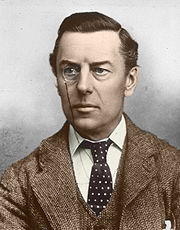
Cabinet of the United Kingdom
The Cabinet of the United Kingdom is the collective decision-making body of Her Majesty's Government in the United Kingdom, composed of the Prime Minister and some 22 Cabinet Ministers, the most senior of the government ministers....
minister in charge of managing the United Kingdom
United Kingdom
The United Kingdom of Great Britain and Northern IrelandIn the United Kingdom and Dependencies, other languages have been officially recognised as legitimate autochthonous languages under the European Charter for Regional or Minority Languages...
's various colonial dependencies
British Empire
The British Empire comprised the dominions, colonies, protectorates, mandates and other territories ruled or administered by the United Kingdom. It originated with the overseas colonies and trading posts established by England in the late 16th and early 17th centuries. At its height, it was the...
.
The position was first created in 1768 to deal with the increasingly troublesome North American
Thirteen Colonies
The Thirteen Colonies were English and later British colonies established on the Atlantic coast of North America between 1607 and 1733. They declared their independence in the American Revolution and formed the United States of America...
colonies. Previously those responsibilities had fallen to the Secretary of State for the Southern Department
Secretary of State for the Southern Department
The Secretary of State for the Southern Department was a position in the cabinet of the government of Kingdom of Great Britain up to 1782.Before 1782, the responsibilities of the two British Secretaries of State were divided not based on the principles of modern ministerial divisions, but...
, who was responsible for Southern England, Wales
Wales
Wales is a country that is part of the United Kingdom and the island of Great Britain, bordered by England to its east and the Atlantic Ocean and Irish Sea to its west. It has a population of three million, and a total area of 20,779 km²...
, Ireland
Ireland
Ireland is an island to the northwest of continental Europe. It is the third-largest island in Europe and the twentieth-largest island on Earth...
, the American colonies, and relations with the Catholic
Roman Catholic Church
The Catholic Church, also known as the Roman Catholic Church, is the world's largest Christian church, with over a billion members. Led by the Pope, it defines its mission as spreading the gospel of Jesus Christ, administering the sacraments and exercising charity...
and Muslim
Islam
Islam . The most common are and . : Arabic pronunciation varies regionally. The first vowel ranges from ~~. The second vowel ranges from ~~~...
states of Europe
Europe
Europe is, by convention, one of the world's seven continents. Comprising the westernmost peninsula of Eurasia, Europe is generally 'divided' from Asia to its east by the watershed divides of the Ural and Caucasus Mountains, the Ural River, the Caspian and Black Seas, and the waterways connecting...
.
In 1782, following the loss of the American colonies, the office was abolished, and its duties given to the Home Secretary, then Lord Sydney
Thomas Townshend, 1st Viscount Sydney
Thomas Townshend, 1st Viscount Sydney PC , was a British politician who held several important Cabinet posts in the second half of the 18th century...
. In 1794 a new office was created for Henry Dundas — the Secretary of State for War
Secretary of State for War
The position of Secretary of State for War, commonly called War Secretary, was a British cabinet-level position, first held by Henry Dundas . In 1801 the post became that of Secretary of State for War and the Colonies. The position was re-instated in 1854...
, which now took responsibility for the Colonies, and was renamed the Secretary of State for War and the Colonies
Secretary of State for War and the Colonies
The Secretary of State for War and the Colonies was a British cabinet level position responsible for the army and the British colonies . The Department was created in 1801...
in 1801. In 1854, military reforms led to the Colonial and Military responsibilities of this secretary of state being split into two separate offices, with Sir George Grey
Sir George Grey, 2nd Baronet
Sir George Grey, 2nd Baronet, PC was a British Whig politician. He held office under four Prime Ministers, Lord Melbourne, Lord John Russell, Lord Aberdeen, and Lord Palmerston, and notably served three times as Home Secretary.-Background and education:Grey was the only son of Sir George Grey, 1st...
becoming the first Secretary of State for the Colonies under the new arrangement.
In the latter part of the nineteenth century the United Kingdom also gained control over a number of territories with the status of "protectorate
Protectorate
In history, the term protectorate has two different meanings. In its earliest inception, which has been adopted by modern international law, it is an autonomous territory that is protected diplomatically or militarily against third parties by a stronger state or entity...
". The ministerial responsibility for these territories was initially held by the Foreign Secretary. However, by the early years of the twentieth century the responsibility for each of these territories had been transferred to the Colonial Secretary as well. The League of Nations mandated territories
League of Nations mandate
A League of Nations mandate was a legal status for certain territories transferred from the control of one country to another following World War I, or the legal instruments that contained the internationally agreed-upon terms for administering the territory on behalf of the League...
acquired as a result of the Treaty of Versailles (1919) became a further responsibility of the Colonial Office in the aftermath of the First World War.
In 1925 part of the Colonial Office
Colonial Office
Colonial Office is the government agency which serves to oversee and supervise their colony* Colonial Office - The British Government department* Office of Insular Affairs - the American government agency* Reichskolonialamt - the German Colonial Office...
was separated out as the Dominions Office, with its own Secretary of State
Secretary of State for Dominion Affairs
The position of Secretary of State for Dominion Affairs was a British cabinet level position created in 1925 responsible for British relations with the Dominions — Canada, Australia, New Zealand, South Africa, Newfoundland, and the Irish Free State, as well as the self-governing colony of...
. The new office was responsible for dealing with the Dominion
Dominion
A dominion, often Dominion, refers to one of a group of autonomous polities that were nominally under British sovereignty, constituting the British Empire and British Commonwealth, beginning in the latter part of the 19th century. They have included Canada, Australia, New Zealand, Newfoundland,...
s together with a small number of other territories (most notably Southern Rhodesia
Southern Rhodesia
Southern Rhodesia was the name of the British colony situated north of the Limpopo River and the Union of South Africa. From its independence in 1965 until its extinction in 1980, it was known as Rhodesia...
).
In the twenty years following the end of the Second World War, much of the British Empire was dismantled as its various territories gained independence. In consequence, the Colonial Office was merged in 1966 with the Commonwealth Relations Office (which until 1947 had been the Dominions Office) to form the Commonwealth Office, while ministerial responsibility was transferred to the Secretary of State for Commonwealth Affairs
Secretary of State for Commonwealth Affairs
The position of Secretary of State for Commonwealth Affairs was created on 1 August 1966 by the merger of the old positions of Secretary of State for Commonwealth Relations and Secretary of State for the Colonies. The position dealt with British relations with members of the Commonwealth of Nations...
(previously known as the Secretary of State for Commonwealth Relations
Secretary of State for Commonwealth Relations
The Secretary of State for Commonwealth Relations was a British Cabinet office existing between 1947 and 1966, responsible for dealing with British relationship with members of the Commonwealth of Nations . The position was created out of the old position of Secretary of State for Dominion Affairs...
). In 1968 the Commonwealth Office was subsumed into the Foreign Office, which was renamed the Foreign and Commonwealth Office
Foreign and Commonwealth Office
The Foreign and Commonwealth Office, commonly called the Foreign Office or the FCO is a British government department responsible for promoting the interests of the United Kingdom overseas, created in 1968 by merging the Foreign Office and the Commonwealth Office.The head of the FCO is the...
(FCO).
The Colonial Secretary never had responsibility for the provinces and princely state
Princely state
A Princely State was a nominally sovereign entitity of British rule in India that was not directly governed by the British, but rather by an Indian ruler under a form of indirect rule such as suzerainty or paramountcy.-British relationship with the Princely States:India under the British Raj ...
s of India
British Raj
British Raj was the British rule in the Indian subcontinent between 1858 and 1947; The term can also refer to the period of dominion...
, which had its own Secretary of State
Secretary of State for India
The Secretary of State for India, or India Secretary, was the British Cabinet minister responsible for the government of India and the political head of the India Office...
.
From 1768 until 1966 the Secretary of State was supported by an Under-Secretary of State for the Colonies
Under-Secretary of State for the Colonies
The Under-Secretary of State for the Colonies was a junior Ministerial post in the United Kingdom government, subordinate to the Secretary of State for the Colonies and, from 1948, also to a Minister of State....
(at times an Under-Secretary of State for War and the Colonies
Under-Secretary of State for War and the Colonies
The Under-Secretary of State for War and the Colonies was a junior Ministerial post in the United Kingdom government, subordinate to the Secretary of State for War and the Colonies....
), and latterly by a Minister of State
Under-Secretary of State for the Colonies
The Under-Secretary of State for the Colonies was a junior Ministerial post in the United Kingdom government, subordinate to the Secretary of State for the Colonies and, from 1948, also to a Minister of State....
.
Secretaries of State for the Colonies, 1768–1782
| Name | Portrait | Took office | Left office | |
|---|---|---|---|---|
| The Earl of Hillsborough Wills Hill, 1st Marquess of Downshire Wills Hill, 1st Marquess of Downshire PC , known as the Viscount Hillsborough from 1742 to 1751 and as the Earl of Hillsborough from 1751 to 1789, was a British politician of the Georgian era... |
 |
27 February 1768 | 27 August 1772 | |
| The Earl of Dartmouth William Legge, 2nd Earl of Dartmouth William Legge 2nd Earl of Dartmouth PC, FRS , styled as Viscount Lewisham from 1732 to 1750, was a British statesman who is most remembered for his part in the government before and during the American Revolution.... |
 |
27 August 1772 | 10 November 1775 | |
| Lord George Germain George Germain, 1st Viscount Sackville George Germain, 1st Viscount Sackville PC , known as the Hon. George Sackville to 1720, as Lord George Sackville from 1720 to 1770, and as Lord George Germain from 1770 to 1782, was a British soldier and politician who was Secretary of State for America in Lord North's cabinet during the American... |
 |
10 November 1775 | February 1782 | |
| Welbore Ellis Welbore Ellis, 1st Baron Mendip Welbore Ellis, 1st Baron Mendip PC FRS was a British statesman. He held a number of political offices, including briefly serving as Secretary for the Colonies in 1782 during the American War of Independence.-Background:... |
 |
February 1782 | 8 March 1782 | |
Responsibility for the Colonies held by:
- Home SecretaryHome SecretaryThe Secretary of State for the Home Department, commonly known as the Home Secretary, is the minister in charge of the Home Office of the United Kingdom, and one of the country's four Great Offices of State...
1782–1794 - Secretary of State for WarSecretary of State for WarThe position of Secretary of State for War, commonly called War Secretary, was a British cabinet-level position, first held by Henry Dundas . In 1801 the post became that of Secretary of State for War and the Colonies. The position was re-instated in 1854...
1794–1801 - Secretary of State for War and the ColoniesSecretary of State for War and the ColoniesThe Secretary of State for War and the Colonies was a British cabinet level position responsible for the army and the British colonies . The Department was created in 1801...
1801–1854
Secretaries of State for the Colonies, 1854–1903
| Name | Portrait | Took office | Left office | Political party | Prime Minister | |
|---|---|---|---|---|---|---|
| Sir George Grey, Bt Sir George Grey, 2nd Baronet Sir George Grey, 2nd Baronet, PC was a British Whig politician. He held office under four Prime Ministers, Lord Melbourne, Lord John Russell, Lord Aberdeen, and Lord Palmerston, and notably served three times as Home Secretary.-Background and education:Grey was the only son of Sir George Grey, 1st... |
12 June 1854 | 8 February 1855 | Whig (Coalition) |
Earl of Aberdeen George Hamilton-Gordon, 4th Earl of Aberdeen George Hamilton-Gordon, 4th Earl of Aberdeen KG, KT, FRS, PC , styled Lord Haddo from 1791 to 1801, was a Scottish politician, successively a Tory, Conservative and Peelite, who served as Prime Minister of the United Kingdom from 1852 until 1855.-Early life:Born in Edinburgh on 28 January 1784, he... |
||
| Sidney Herbert Sidney Herbert, 1st Baron Herbert of Lea Sidney Herbert, 1st Baron Herbert of Lea PC was an English statesman and a close ally and confidante of Florence Nightingale.-Early life:... |
8 February 1855 | 23 February 1855 | Whig | Viscount Palmerston | ||
| Lord John Russell John Russell, 1st Earl Russell John Russell, 1st Earl Russell, KG, GCMG, PC , known as Lord John Russell before 1861, was an English Whig and Liberal politician who served twice as Prime Minister of the United Kingdom in the mid-19th century.... |
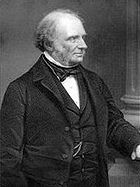 |
23 February 1855 | 21 July 1855 | Whig | ||
| Sir William Molesworth, Bt |  |
21 July 1855 | 21 November 1855 | Whig | ||
| Henry Labouchere Henry Labouchere, 1st Baron Taunton Henry Labouchere, 1st Baron Taunton PC was a prominent British Whig and Liberal Party politician of the mid-19th century.-Background and education:... |
 |
21 November 1855 | 21 February 1858 | Whig | ||
| Lord Stanley Edward Stanley, 15th Earl of Derby Edward Henry Stanley, 15th Earl of Derby KG, PC, FRS , known as Lord Stanley from 1844 to 1869, was a British statesman... |
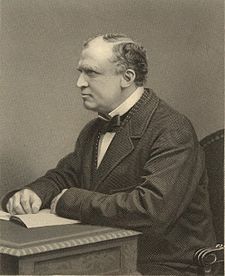 |
26 February 1858 | 5 June 1858 | Conservative Conservative Party (UK) The Conservative Party, formally the Conservative and Unionist Party, is a centre-right political party in the United Kingdom that adheres to the philosophies of conservatism and British unionism. It is the largest political party in the UK, and is currently the largest single party in the House... |
Earl of Derby Edward Smith-Stanley, 14th Earl of Derby Edward George Geoffrey Smith-Stanley, 14th Earl of Derby, KG, PC was an English statesman, three times Prime Minister of the United Kingdom, and to date the longest serving leader of the Conservative Party. He was known before 1834 as Edward Stanley, and from 1834 to 1851 as Lord Stanley... |
|
| Sir Edward Bulwer-Lytton, Bt Edward Bulwer-Lytton, 1st Baron Lytton Edward George Earle Lytton Bulwer-Lytton, 1st Baron Lytton PC , was an English politician, poet, playwright, and novelist. He was immensely popular with the reading public and wrote a stream of bestselling dime-novels which earned him a considerable fortune... |
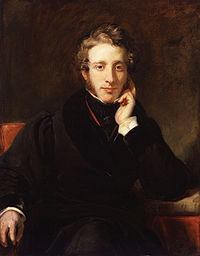 |
5 June 1858 | 11 June 1859 | Conservative Conservative Party (UK) The Conservative Party, formally the Conservative and Unionist Party, is a centre-right political party in the United Kingdom that adheres to the philosophies of conservatism and British unionism. It is the largest political party in the UK, and is currently the largest single party in the House... |
||
| The Duke of Newcastle |  |
18 June 1859 | 7 April 1864 | Liberal Liberal Party (UK) The Liberal Party was one of the two major political parties of the United Kingdom during the 19th and early 20th centuries. It was a third party of negligible importance throughout the latter half of the 20th Century, before merging with the Social Democratic Party in 1988 to form the present day... |
Viscount Palmerston | |
| Edward Cardwell Edward Cardwell, 1st Viscount Cardwell Edward Cardwell, 1st Viscount Cardwell PC, PC , FRS was a prominent British politician in the Peelite and Liberal parties during the middle of the 19th century... |
 |
7 April 1864 | 26 June 1866 | Liberal Liberal Party (UK) The Liberal Party was one of the two major political parties of the United Kingdom during the 19th and early 20th centuries. It was a third party of negligible importance throughout the latter half of the 20th Century, before merging with the Social Democratic Party in 1988 to form the present day... |
||
| Earl Russell John Russell, 1st Earl Russell John Russell, 1st Earl Russell, KG, GCMG, PC , known as Lord John Russell before 1861, was an English Whig and Liberal politician who served twice as Prime Minister of the United Kingdom in the mid-19th century.... |
||||||
| The Earl of Carnarvon Henry Herbert, 4th Earl of Carnarvon Henry Howard Molyneux Herbert, 4th Earl of Carnarvon, PC, DL, FSA, FRS , known as Lord Porchester from 1833 to 1849, was a British politician and a leading member of the Conservative Party... |
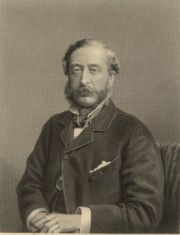 |
6 July 1866 | 8 March 1867 | Conservative Conservative Party (UK) The Conservative Party, formally the Conservative and Unionist Party, is a centre-right political party in the United Kingdom that adheres to the philosophies of conservatism and British unionism. It is the largest political party in the UK, and is currently the largest single party in the House... |
Earl of Derby Edward Smith-Stanley, 14th Earl of Derby Edward George Geoffrey Smith-Stanley, 14th Earl of Derby, KG, PC was an English statesman, three times Prime Minister of the United Kingdom, and to date the longest serving leader of the Conservative Party. He was known before 1834 as Edward Stanley, and from 1834 to 1851 as Lord Stanley... |
|
| The Duke of Buckingham and Chandos Richard Temple-Grenville, 3rd Duke of Buckingham and Chandos Richard Plantagenet Campbell Temple-Nugent-Brydges-Chandos-Grenville, 3rd Duke of Buckingham and Chandos GCSI, PC , styled Earl Temple until 1839 and Marquess of Chandos from 1839 to 1861, was a British soldier, politician and administrator of the 19th century... |
 |
8 March 1867 | 1 December 1868 | Conservative Conservative Party (UK) The Conservative Party, formally the Conservative and Unionist Party, is a centre-right political party in the United Kingdom that adheres to the philosophies of conservatism and British unionism. It is the largest political party in the UK, and is currently the largest single party in the House... |
||
| Benjamin Disraeli | ||||||
| The Earl Granville Granville Leveson-Gower, 2nd Earl Granville Granville George Leveson Gower, 2nd Earl Granville KG, PC FRS , styled Lord Leveson until 1846, was a British Liberal statesman... |
 |
9 December 1868 | 6 July 1870 | Liberal Liberal Party (UK) The Liberal Party was one of the two major political parties of the United Kingdom during the 19th and early 20th centuries. It was a third party of negligible importance throughout the latter half of the 20th Century, before merging with the Social Democratic Party in 1988 to form the present day... |
William Ewart Gladstone William Ewart Gladstone William Ewart Gladstone FRS FSS was a British Liberal statesman. In a career lasting over sixty years, he served as Prime Minister four separate times , more than any other person. Gladstone was also Britain's oldest Prime Minister, 84 years old when he resigned for the last time... |
|
| The Earl of Kimberley John Wodehouse, 1st Earl of Kimberley John Wodehouse, 1st Earl of Kimberley KG , PC , known as the Lord Wodehouse from 1846 to 1866, was a British Liberal politician... |
 |
6 July 1870 | 17 February 1874 | Liberal Liberal Party (UK) The Liberal Party was one of the two major political parties of the United Kingdom during the 19th and early 20th centuries. It was a third party of negligible importance throughout the latter half of the 20th Century, before merging with the Social Democratic Party in 1988 to form the present day... |
||
| The Earl of Carnarvon Henry Herbert, 4th Earl of Carnarvon Henry Howard Molyneux Herbert, 4th Earl of Carnarvon, PC, DL, FSA, FRS , known as Lord Porchester from 1833 to 1849, was a British politician and a leading member of the Conservative Party... |
 |
21 February 1874 | 4 February 1878 | Conservative Conservative Party (UK) The Conservative Party, formally the Conservative and Unionist Party, is a centre-right political party in the United Kingdom that adheres to the philosophies of conservatism and British unionism. It is the largest political party in the UK, and is currently the largest single party in the House... |
Benjamin Disraeli | |
| Sir Michael Hicks Beach, Bt | 4 February 1878 | 21 April 1880 | Conservative Conservative Party (UK) The Conservative Party, formally the Conservative and Unionist Party, is a centre-right political party in the United Kingdom that adheres to the philosophies of conservatism and British unionism. It is the largest political party in the UK, and is currently the largest single party in the House... |
|||
| The Earl of Kimberley John Wodehouse, 1st Earl of Kimberley John Wodehouse, 1st Earl of Kimberley KG , PC , known as the Lord Wodehouse from 1846 to 1866, was a British Liberal politician... |
 |
21 April 1880 | 16 December 1882 | Liberal Liberal Party (UK) The Liberal Party was one of the two major political parties of the United Kingdom during the 19th and early 20th centuries. It was a third party of negligible importance throughout the latter half of the 20th Century, before merging with the Social Democratic Party in 1988 to form the present day... |
William Ewart Gladstone William Ewart Gladstone William Ewart Gladstone FRS FSS was a British Liberal statesman. In a career lasting over sixty years, he served as Prime Minister four separate times , more than any other person. Gladstone was also Britain's oldest Prime Minister, 84 years old when he resigned for the last time... |
|
| The Earl of Derby Edward Stanley, 15th Earl of Derby Edward Henry Stanley, 15th Earl of Derby KG, PC, FRS , known as Lord Stanley from 1844 to 1869, was a British statesman... |
 |
16 December 1882 | 9 June 1885 | Liberal Liberal Party (UK) The Liberal Party was one of the two major political parties of the United Kingdom during the 19th and early 20th centuries. It was a third party of negligible importance throughout the latter half of the 20th Century, before merging with the Social Democratic Party in 1988 to form the present day... |
||
| Frederick Stanley Frederick Stanley, 16th Earl of Derby Frederick Arthur Stanley, 16th Earl of Derby KG, GCB, GCVO, PC , known as Frederick Stanley until 1886 and as Lord Stanley of Preston between 1886 and 1893, was a Conservative Party politician in the United Kingdom who served as Colonial Secretary from 1885 to 1886 and the sixth Governor General... |
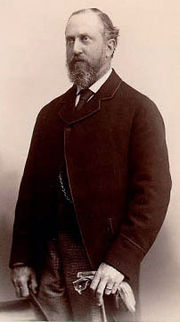 |
24 June 1885 | 28 January 1886 | Conservative Conservative Party (UK) The Conservative Party, formally the Conservative and Unionist Party, is a centre-right political party in the United Kingdom that adheres to the philosophies of conservatism and British unionism. It is the largest political party in the UK, and is currently the largest single party in the House... |
Marquess of Salisbury Robert Gascoyne-Cecil, 3rd Marquess of Salisbury Robert Arthur Talbot Gascoyne-Cecil, 3rd Marquess of Salisbury, KG, GCVO, PC , styled Lord Robert Cecil before 1865 and Viscount Cranborne from June 1865 until April 1868, was a British Conservative statesman and thrice Prime Minister, serving for a total of over 13 years... |
|
| The Earl Granville Granville Leveson-Gower, 2nd Earl Granville Granville George Leveson Gower, 2nd Earl Granville KG, PC FRS , styled Lord Leveson until 1846, was a British Liberal statesman... |
 |
6 February 1886 | 20 July 1886 | Liberal Liberal Party (UK) The Liberal Party was one of the two major political parties of the United Kingdom during the 19th and early 20th centuries. It was a third party of negligible importance throughout the latter half of the 20th Century, before merging with the Social Democratic Party in 1988 to form the present day... |
William Ewart Gladstone William Ewart Gladstone William Ewart Gladstone FRS FSS was a British Liberal statesman. In a career lasting over sixty years, he served as Prime Minister four separate times , more than any other person. Gladstone was also Britain's oldest Prime Minister, 84 years old when he resigned for the last time... |
|
| Edward Stanhope Edward Stanhope Edward Stanhope was a British Conservative Party politician.-Background and education:Born in London, Stanhope was the second son of Philip Stanhope, 5th Earl Stanhope, by his wife Emily Harriet, daughter of General Sir Edward Kerrison, 1st Baronet... |
3 August 1886 | 14 January 1887 | Conservative Conservative Party (UK) The Conservative Party, formally the Conservative and Unionist Party, is a centre-right political party in the United Kingdom that adheres to the philosophies of conservatism and British unionism. It is the largest political party in the UK, and is currently the largest single party in the House... |
Marquess of Salisbury Robert Gascoyne-Cecil, 3rd Marquess of Salisbury Robert Arthur Talbot Gascoyne-Cecil, 3rd Marquess of Salisbury, KG, GCVO, PC , styled Lord Robert Cecil before 1865 and Viscount Cranborne from June 1865 until April 1868, was a British Conservative statesman and thrice Prime Minister, serving for a total of over 13 years... |
||
| The Lord Knutsford Henry Holland, 1st Viscount Knutsford Henry Thurstan Holland, 1st Viscount Knutsford GCMG, PC , known as Sir Henry Holland, Bt, from 1873 to 1888 and as The Lord Knutsford from 1888 to 1895, was a British Conservative politician, best known for serving as Secretary of State for the Colonies from 1887 to 1892.-Background and... |
14 January 1887 | 11 August 1892 | Conservative Conservative Party (UK) The Conservative Party, formally the Conservative and Unionist Party, is a centre-right political party in the United Kingdom that adheres to the philosophies of conservatism and British unionism. It is the largest political party in the UK, and is currently the largest single party in the House... |
|||
| The Marquess of Ripon George Robinson, 1st Marquess of Ripon George Frederick Samuel Robinson, 1st Marquess of Ripon KG, GCSI, CIE, PC , known as Viscount Goderich from 1833 to 1859 and as the Earl de Grey and Ripon from 1859 to 1871, was a British politician who served in every Liberal cabinet from 1861 until his death forty-eight years later.-Background... |
 |
18 August 1892 | 21 June 1895 | Liberal Liberal Party (UK) The Liberal Party was one of the two major political parties of the United Kingdom during the 19th and early 20th centuries. It was a third party of negligible importance throughout the latter half of the 20th Century, before merging with the Social Democratic Party in 1988 to form the present day... |
William Ewart Gladstone William Ewart Gladstone William Ewart Gladstone FRS FSS was a British Liberal statesman. In a career lasting over sixty years, he served as Prime Minister four separate times , more than any other person. Gladstone was also Britain's oldest Prime Minister, 84 years old when he resigned for the last time... |
|
| Earl of Rosebery Archibald Primrose, 5th Earl of Rosebery Archibald Philip Primrose, 5th Earl of Rosebery, KG, PC was a British Liberal statesman and Prime Minister. Between the death of his father, in 1851, and the death of his grandfather, the 4th Earl, in 1868, he was known by the courtesy title of Lord Dalmeny.Rosebery was a Liberal Imperialist who... |
||||||
| Joseph Chamberlain Joseph Chamberlain Joseph Chamberlain was an influential British politician and statesman. Unlike most major politicians of the time, he was a self-made businessman and had not attended Oxford or Cambridge University.... |
 |
29 June 1895 | 16 September 1903 | Liberal Unionist Liberal Unionist Party The Liberal Unionist Party was a British political party that was formed in 1886 by a faction that broke away from the Liberal Party. Led by Lord Hartington and Joseph Chamberlain, the party formed a political alliance with the Conservative Party in opposition to Irish Home Rule... |
Marquess of Salisbury Robert Gascoyne-Cecil, 3rd Marquess of Salisbury Robert Arthur Talbot Gascoyne-Cecil, 3rd Marquess of Salisbury, KG, GCVO, PC , styled Lord Robert Cecil before 1865 and Viscount Cranborne from June 1865 until April 1868, was a British Conservative statesman and thrice Prime Minister, serving for a total of over 13 years... |
|
| Arthur Balfour Arthur Balfour Arthur James Balfour, 1st Earl of Balfour, KG, OM, PC, DL was a British Conservative politician and statesman... |
||||||
Secretaries of State for the Colonies, 1903–1966
| Name | Portrait | Took office | Left office | Political party | Prime Minister | |
|---|---|---|---|---|---|---|
| Alfred Lyttelton Alfred Lyttelton Alfred Lyttelton QC was a British politician and sportsman who excelled at both football and cricket. During his time at university he participated in Varsity Matches in five sports: cricket , football , athletics , rackets and real tennis , displaying an ability that made him... |
 |
11 October 1903 | 4 December 1905 | Liberal Unionist Liberal Unionist Party The Liberal Unionist Party was a British political party that was formed in 1886 by a faction that broke away from the Liberal Party. Led by Lord Hartington and Joseph Chamberlain, the party formed a political alliance with the Conservative Party in opposition to Irish Home Rule... |
Arthur Balfour Arthur Balfour Arthur James Balfour, 1st Earl of Balfour, KG, OM, PC, DL was a British Conservative politician and statesman... |
|
| The Earl of Elgin Victor Bruce, 9th Earl of Elgin Victor Alexander Bruce, 9th Earl of Elgin, 13th Earl of Kincardine, KG, GCSI, GCIE, PC , known as Lord Bruce until 1863, was a British statesman who served as Viceroy of India from 1894 to 1899.-Background and education:... |
 |
10 December 1905 | 12 April 1908 | Liberal Liberal Party (UK) The Liberal Party was one of the two major political parties of the United Kingdom during the 19th and early 20th centuries. It was a third party of negligible importance throughout the latter half of the 20th Century, before merging with the Social Democratic Party in 1988 to form the present day... |
Sir Henry Campbell-Bannerman Henry Campbell-Bannerman Sir Henry Campbell-Bannerman GCB was a British Liberal Party politician who served as Prime Minister of the United Kingdom from 1905 to 1908 and Leader of the Liberal Party from 1899 to 1908. He also served as Secretary of State for War twice, in the Cabinets of Gladstone and Rosebery... |
|
| The Earl of Crewe Robert Crewe-Milnes, 1st Marquess of Crewe Robert Offley Ashburton Crewe-Milnes, 1st Marquess of Crewe KG, PC , known as The Lord Houghton from 1885 to 1895 and as The Earl of Crewe from 1895 to 1911, was a British statesman and writer.... |
 |
12 April 1908 | 3 November 1910 | Liberal Liberal Party (UK) The Liberal Party was one of the two major political parties of the United Kingdom during the 19th and early 20th centuries. It was a third party of negligible importance throughout the latter half of the 20th Century, before merging with the Social Democratic Party in 1988 to form the present day... |
H. H. Asquith H. H. Asquith Herbert Henry Asquith, 1st Earl of Oxford and Asquith, KG, PC, KC served as the Liberal Prime Minister of the United Kingdom from 1908 to 1916... |
|
| Lewis Vernon Harcourt Lewis Vernon Harcourt, 1st Viscount Harcourt Lewis Vernon Harcourt, 1st Viscount Harcourt PC was a British Liberal Party politician who held the Cabinet office of Secretary of State for the Colonies from 1910 to 1915... |
3 November 1910 | 25 May 1915 | Liberal Liberal Party (UK) The Liberal Party was one of the two major political parties of the United Kingdom during the 19th and early 20th centuries. It was a third party of negligible importance throughout the latter half of the 20th Century, before merging with the Social Democratic Party in 1988 to form the present day... |
|||
| Andrew Bonar Law |  |
25 May 1915 | 10 December 1916 | Conservative Conservative Party (UK) The Conservative Party, formally the Conservative and Unionist Party, is a centre-right political party in the United Kingdom that adheres to the philosophies of conservatism and British unionism. It is the largest political party in the UK, and is currently the largest single party in the House... (Coalition Coalition government 1915–1916 Asquith's British coalition government of 1915-1916 was formed in the aftermath of the Gallipoli disaster, by bringing in the Conservatives to shore up the government. The Conservatives were not terribly pleased with the offices they received in this new government and Tory leader Andrew Bonar Law... ) |
||
| Walter Long |  |
10 December 1916 | 10 January 1919 | Conservative Conservative Party (UK) The Conservative Party, formally the Conservative and Unionist Party, is a centre-right political party in the United Kingdom that adheres to the philosophies of conservatism and British unionism. It is the largest political party in the UK, and is currently the largest single party in the House... (Coalition) |
David Lloyd George David Lloyd George David Lloyd George, 1st Earl Lloyd-George of Dwyfor OM, PC was a British Liberal politician and statesman... |
|
| The Viscount Milner Alfred Milner, 1st Viscount Milner Alfred Milner, 1st Viscount Milner KG, GCB, GCMG, PC was a British statesman and colonial administrator who played an influential leadership role in the formulation of foreign and domestic policy between the mid-1890s and early 1920s... |
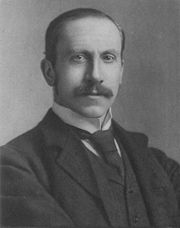 |
10 January 1919 | 13 February 1921 | Liberal Liberal Party (UK) The Liberal Party was one of the two major political parties of the United Kingdom during the 19th and early 20th centuries. It was a third party of negligible importance throughout the latter half of the 20th Century, before merging with the Social Democratic Party in 1988 to form the present day... (Coalition) |
||
| Winston Churchill Winston Churchill Sir Winston Leonard Spencer-Churchill, was a predominantly Conservative British politician and statesman known for his leadership of the United Kingdom during the Second World War. He is widely regarded as one of the greatest wartime leaders of the century and served as Prime Minister twice... |
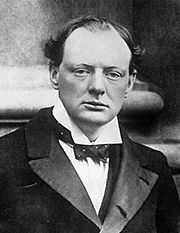 |
13 February 1921 | 19 October 1922 | Liberal Liberal Party (UK) The Liberal Party was one of the two major political parties of the United Kingdom during the 19th and early 20th centuries. It was a third party of negligible importance throughout the latter half of the 20th Century, before merging with the Social Democratic Party in 1988 to form the present day... (Coalition) |
||
| The Duke of Devonshire Victor Cavendish, 9th Duke of Devonshire Victor Christian William Cavendish, 9th Duke of Devonshire , known as Victor Cavendish until 1908, was a British politician who served as Governor General of Canada, the 11th since Canadian Confederation.... |
 |
24 October 1922 | 22 January 1924 | Conservative Conservative Party (UK) The Conservative Party, formally the Conservative and Unionist Party, is a centre-right political party in the United Kingdom that adheres to the philosophies of conservatism and British unionism. It is the largest political party in the UK, and is currently the largest single party in the House... |
Andrew Bonar Law | |
| Stanley Baldwin Stanley Baldwin Stanley Baldwin, 1st Earl Baldwin of Bewdley, KG, PC was a British Conservative politician, who dominated the government in his country between the two world wars... |
||||||
| James Henry Thomas James Henry Thomas James Henry "Jimmy" Thomas was a British trade unionist and Labour politician. He was involved in a political scandal involving budget leaks.-Early career and Trade Union activities:... |
22 January 1924 | 3 November 1924 | Labour Labour Party (UK) The Labour Party is a centre-left democratic socialist party in the United Kingdom. It surpassed the Liberal Party in general elections during the early 1920s, forming minority governments under Ramsay MacDonald in 1924 and 1929-1931. The party was in a wartime coalition from 1940 to 1945, after... |
Ramsay MacDonald Ramsay MacDonald James Ramsay MacDonald, PC, FRS was a British politician who was the first ever Labour Prime Minister, leading a minority government for two terms.... |
||
| Leo Amery |  |
6 November 1924 | 4 June 1929 | Conservative Conservative Party (UK) The Conservative Party, formally the Conservative and Unionist Party, is a centre-right political party in the United Kingdom that adheres to the philosophies of conservatism and British unionism. It is the largest political party in the UK, and is currently the largest single party in the House... |
Stanley Baldwin Stanley Baldwin Stanley Baldwin, 1st Earl Baldwin of Bewdley, KG, PC was a British Conservative politician, who dominated the government in his country between the two world wars... |
|
| The Lord Passfield | 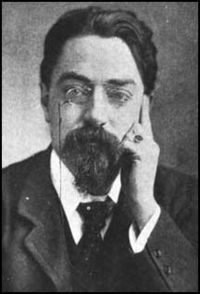 |
7 June 1929 | 24 August 1931 | Labour Labour Party (UK) The Labour Party is a centre-left democratic socialist party in the United Kingdom. It surpassed the Liberal Party in general elections during the early 1920s, forming minority governments under Ramsay MacDonald in 1924 and 1929-1931. The party was in a wartime coalition from 1940 to 1945, after... |
Ramsay MacDonald Ramsay MacDonald James Ramsay MacDonald, PC, FRS was a British politician who was the first ever Labour Prime Minister, leading a minority government for two terms.... |
|
| James Henry Thomas James Henry Thomas James Henry "Jimmy" Thomas was a British trade unionist and Labour politician. He was involved in a political scandal involving budget leaks.-Early career and Trade Union activities:... |
25 August 1931 | 5 November 1931 | National Labour (National Govt) |
|||
| Sir Philip Cunliffe-Lister Philip Cunliffe-Lister, 1st Earl of Swinton Philip Cunliffe-Lister, 1st Earl of Swinton GBE, CH, MC, PC , known as Philip Lloyd-Greame until 1924 and as The Viscount Swinton from 1935 until 1955, was a prominent British Conservative politician from the 1920s until the 1950s.-Background and early life:Born as Philip Lloyd-Graeme, he was the... |
 |
5 November 1931 | 7 June 1935 | Conservative Conservative Party (UK) The Conservative Party, formally the Conservative and Unionist Party, is a centre-right political party in the United Kingdom that adheres to the philosophies of conservatism and British unionism. It is the largest political party in the UK, and is currently the largest single party in the House... (National Govt Second National Government 1931–1935 The United Kingdom's National Government was composed of members of the following parties:*National Labour*Conservative Party*Liberal Party*Liberal National Party... ) |
||
| Malcolm MacDonald Malcolm MacDonald Malcolm John MacDonald OM, PC was a British politician and diplomat.-Background:MacDonald was the son of Prime Minister Ramsay MacDonald and Margaret MacDonald. Like his father he was born in Lossiemouth, Moray... |
7 June 1935 | 22 November 1935 | National Labour (National Govt) |
Stanley Baldwin Stanley Baldwin Stanley Baldwin, 1st Earl Baldwin of Bewdley, KG, PC was a British Conservative politician, who dominated the government in his country between the two world wars... |
||
| James Henry Thomas James Henry Thomas James Henry "Jimmy" Thomas was a British trade unionist and Labour politician. He was involved in a political scandal involving budget leaks.-Early career and Trade Union activities:... |
22 November 1935 | 22 May 1936 | National Labour (National Govt) |
|||
| William Ormsby-Gore William Ormsby-Gore, 4th Baron Harlech William George Arthur Ormsby-Gore, 4th Baron Harlech KG, GCMG, PC , known as William Ormsby-Gore until 1938, was a British Conservative politician and banker.-Background:... |
 |
28 May 1936 | 16 May 1938 | Conservative Conservative Party (UK) The Conservative Party, formally the Conservative and Unionist Party, is a centre-right political party in the United Kingdom that adheres to the philosophies of conservatism and British unionism. It is the largest political party in the UK, and is currently the largest single party in the House... (National Govt) |
||
| Neville Chamberlain Neville Chamberlain Arthur Neville Chamberlain FRS was a British Conservative politician who served as Prime Minister of the United Kingdom from May 1937 to May 1940. Chamberlain is best known for his appeasement foreign policy, and in particular for his signing of the Munich Agreement in 1938, conceding the... |
||||||
| Malcolm MacDonald Malcolm MacDonald Malcolm John MacDonald OM, PC was a British politician and diplomat.-Background:MacDonald was the son of Prime Minister Ramsay MacDonald and Margaret MacDonald. Like his father he was born in Lossiemouth, Moray... |
16 May 1938 | 12 May 1940 | National Labour (National Govt; War Govt) |
|||
| The Lord Lloyd | 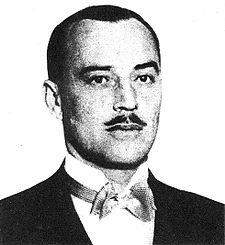 |
12 May 1940 | 8 February 1941 | Conservative Conservative Party (UK) The Conservative Party, formally the Conservative and Unionist Party, is a centre-right political party in the United Kingdom that adheres to the philosophies of conservatism and British unionism. It is the largest political party in the UK, and is currently the largest single party in the House... (Coalition) |
Winston Churchill Winston Churchill Sir Winston Leonard Spencer-Churchill, was a predominantly Conservative British politician and statesman known for his leadership of the United Kingdom during the Second World War. He is widely regarded as one of the greatest wartime leaders of the century and served as Prime Minister twice... |
|
| The Lord Moyne Walter Guinness, 1st Baron Moyne Walter Edward Guinness, 1st Baron Moyne DSO & Bar PC was a Anglo-Irish politician and businessman. He served as the British minister of state in the Middle East until November 1944, when he was assassinated by the militant Jewish Zionist group Lehi... |
8 February 1941 | 22 February 1942 | Conservative Conservative Party (UK) The Conservative Party, formally the Conservative and Unionist Party, is a centre-right political party in the United Kingdom that adheres to the philosophies of conservatism and British unionism. It is the largest political party in the UK, and is currently the largest single party in the House... (Coalition) |
|||
| Viscount Cranborne Robert Gascoyne-Cecil, 5th Marquess of Salisbury Robert Arthur James Gascoyne-Cecil, 5th Marquess of Salisbury, KG, PC , known as Viscount Cranborne from 1903 to 1947, was a British Conservative politician.-Background:... |
22 February 1942 | 22 November 1942 | Conservative Conservative Party (UK) The Conservative Party, formally the Conservative and Unionist Party, is a centre-right political party in the United Kingdom that adheres to the philosophies of conservatism and British unionism. It is the largest political party in the UK, and is currently the largest single party in the House... (Coalition) |
|||
| Oliver Stanley Oliver Stanley Oliver Frederick George Stanley MC, PC was a prominent British Conservative politician who held many ministerial posts before his early death when it was expected he would soon assume higher office.... |
 |
22 November 1942 | 26 July 1945 | Conservative Conservative Party (UK) The Conservative Party, formally the Conservative and Unionist Party, is a centre-right political party in the United Kingdom that adheres to the philosophies of conservatism and British unionism. It is the largest political party in the UK, and is currently the largest single party in the House... (Coalition) |
||
| George Hall |  |
3 August 1945 | 4 October 1946 | Labour Labour Party (UK) The Labour Party is a centre-left democratic socialist party in the United Kingdom. It surpassed the Liberal Party in general elections during the early 1920s, forming minority governments under Ramsay MacDonald in 1924 and 1929-1931. The party was in a wartime coalition from 1940 to 1945, after... |
Clement Attlee Clement Attlee Clement Richard Attlee, 1st Earl Attlee, KG, OM, CH, PC, FRS was a British Labour politician who served as the Prime Minister of the United Kingdom from 1945 to 1951, and as the Leader of the Labour Party from 1935 to 1955... |
|
| Arthur Creech Jones Arthur Creech Jones Arthur Creech Jones was a British trade union official and politician. Originally a civil servant, his imprisonment as a conscientious objector during the First World War forced him to change careers. A protégé of Ernest Bevin, he was elected to Parliament in 1935 and served in the Colonial Office... |
 |
4 October 1946 | 28 February 1950 | Labour Labour Party (UK) The Labour Party is a centre-left democratic socialist party in the United Kingdom. It surpassed the Liberal Party in general elections during the early 1920s, forming minority governments under Ramsay MacDonald in 1924 and 1929-1931. The party was in a wartime coalition from 1940 to 1945, after... |
||
| Jim Griffiths Jim Griffiths James "Jim" Griffiths CH , was a Welsh Labour politician, trade union leader and the first ever Secretary of State for Wales.-Background and education:... |
 |
28 February 1950 | 26 October 1951 | Labour Labour Party (UK) The Labour Party is a centre-left democratic socialist party in the United Kingdom. It surpassed the Liberal Party in general elections during the early 1920s, forming minority governments under Ramsay MacDonald in 1924 and 1929-1931. The party was in a wartime coalition from 1940 to 1945, after... |
||
| Oliver Lyttelton Oliver Lyttelton, 1st Viscount Chandos Oliver Lyttelton, 1st Viscount Chandos KG, PC, DSO, MC was a British businessman who was brought into government during the Second World War, holding a number of ministerial posts.-Background, education and military career:... |
 |
28 October 1951 | 28 July 1954 | Conservative Conservative Party (UK) The Conservative Party, formally the Conservative and Unionist Party, is a centre-right political party in the United Kingdom that adheres to the philosophies of conservatism and British unionism. It is the largest political party in the UK, and is currently the largest single party in the House... |
Sir Winston Churchill Winston Churchill Sir Winston Leonard Spencer-Churchill, was a predominantly Conservative British politician and statesman known for his leadership of the United Kingdom during the Second World War. He is widely regarded as one of the greatest wartime leaders of the century and served as Prime Minister twice... |
|
| Alan Lennox-Boyd Alan Lennox-Boyd, 1st Viscount Boyd of Merton Alan Tindal Lennox-Boyd, 1st Viscount Boyd of Merton, CH, PC, DL was a British Conservative politician.-Background, education and military service:... |
 |
28 July 1954 | 14 October 1959 | Conservative Conservative Party (UK) The Conservative Party, formally the Conservative and Unionist Party, is a centre-right political party in the United Kingdom that adheres to the philosophies of conservatism and British unionism. It is the largest political party in the UK, and is currently the largest single party in the House... |
||
| Sir Anthony Eden Anthony Eden Robert Anthony Eden, 1st Earl of Avon, KG, MC, PC was a British Conservative politician, who was Prime Minister from 1955 to 1957... |
||||||
| Harold Macmillan Harold Macmillan Maurice Harold Macmillan, 1st Earl of Stockton, OM, PC was Conservative Prime Minister of the United Kingdom from 10 January 1957 to 18 October 1963.... |
||||||
| Iain Macleod Iain Macleod Iain Norman Macleod was a British Conservative Party politician and government minister.-Early life:... |
 |
14 October 1959 | 9 October 1961 | Conservative Conservative Party (UK) The Conservative Party, formally the Conservative and Unionist Party, is a centre-right political party in the United Kingdom that adheres to the philosophies of conservatism and British unionism. It is the largest political party in the UK, and is currently the largest single party in the House... |
||
| Reginald Maudling Reginald Maudling Reginald Maudling was a British politician who held several Cabinet posts, including Chancellor of the Exchequer. He had been spoken of as a prospective Conservative leader since 1955, and was twice seriously considered for the post; he was Edward Heath's chief rival in 1965... |
9 October 1961 | 13 July 1962 | Conservative Conservative Party (UK) The Conservative Party, formally the Conservative and Unionist Party, is a centre-right political party in the United Kingdom that adheres to the philosophies of conservatism and British unionism. It is the largest political party in the UK, and is currently the largest single party in the House... |
|||
| Duncan Sandys Duncan Sandys Edwin Duncan Sandys, Baron Duncan-Sandys CH PC was a British politician and a minister in successive Conservative governments in the 1950s and 1960s... |
 |
13 July 1962 | 16 October 1964 | Conservative Conservative Party (UK) The Conservative Party, formally the Conservative and Unionist Party, is a centre-right political party in the United Kingdom that adheres to the philosophies of conservatism and British unionism. It is the largest political party in the UK, and is currently the largest single party in the House... |
||
| Sir Alec Douglas-Home Alec Douglas-Home Alexander Frederick Douglas-Home, Baron Home of the Hirsel, KT, PC , known as The Earl of Home from 1951 to 1963 and as Sir Alec Douglas-Home from 1963 to 1974, was a British Conservative politician who served as Prime Minister of the United Kingdom from October 1963 to October 1964.He is the last... |
||||||
| Anthony Greenwood |  |
18 October 1964 | 23 December 1965 | Labour Labour Party (UK) The Labour Party is a centre-left democratic socialist party in the United Kingdom. It surpassed the Liberal Party in general elections during the early 1920s, forming minority governments under Ramsay MacDonald in 1924 and 1929-1931. The party was in a wartime coalition from 1940 to 1945, after... |
Harold Wilson Harold Wilson James Harold Wilson, Baron Wilson of Rievaulx, KG, OBE, FRS, FSS, PC was a British Labour Member of Parliament, Leader of the Labour Party. He was twice Prime Minister of the United Kingdom during the 1960s and 1970s, winning four general elections, including a minority government after the... |
|
| The Earl of Longford Frank Pakenham, 7th Earl of Longford Francis Aungier Pakenham, 7th Earl of Longford KG, PC , known as the Lord Pakenham from 1945 to 1961, was a British politician, author, and social reformer... |
23 December 1965 | 6 April 1966 | Labour Labour Party (UK) The Labour Party is a centre-left democratic socialist party in the United Kingdom. It surpassed the Liberal Party in general elections during the early 1920s, forming minority governments under Ramsay MacDonald in 1924 and 1929-1931. The party was in a wartime coalition from 1940 to 1945, after... |
|||
| Frederick Lee |  |
6 April 1966 | 1 August 1966 | Labour Labour Party (UK) The Labour Party is a centre-left democratic socialist party in the United Kingdom. It surpassed the Liberal Party in general elections during the early 1920s, forming minority governments under Ramsay MacDonald in 1924 and 1929-1931. The party was in a wartime coalition from 1940 to 1945, after... |
||
Responsibility for the colonies held by:
- Secretary of State for Commonwealth AffairsSecretary of State for Commonwealth AffairsThe position of Secretary of State for Commonwealth Affairs was created on 1 August 1966 by the merger of the old positions of Secretary of State for Commonwealth Relations and Secretary of State for the Colonies. The position dealt with British relations with members of the Commonwealth of Nations...
1966–1968 - Secretary of State for Foreign and Commonwealth AffairsSecretary of State for Foreign and Commonwealth AffairsThe Secretary of State for Foreign and Commonwealth Affairs, commonly referred to as the Foreign Secretary, is a senior member of Her Majesty's Government heading the Foreign and Commonwealth Office and regarded as one of the Great Offices of State...
1968–present
Following the British Nationality Act 1981
British Nationality Act 1981
The British Nationality Act 1981 was an Act of Parliament passed by the British Parliament concerning British nationality. It has been the basis of British nationality law since 1 January 1983.-History:...
the term "colony" ceased to be used; Britain's rule over the last significant former colony, Hong Kong
Hong Kong
Hong Kong is one of two Special Administrative Regions of the People's Republic of China , the other being Macau. A city-state situated on China's south coast and enclosed by the Pearl River Delta and South China Sea, it is renowned for its expansive skyline and deep natural harbour...
, ceased in 1997. Britain retains certain overseas territories
British overseas territories
The British Overseas Territories are fourteen territories of the United Kingdom which, although they do not form part of the United Kingdom itself, fall under its jurisdiction. They are remnants of the British Empire that have not acquired independence or have voted to remain British territories...
.

